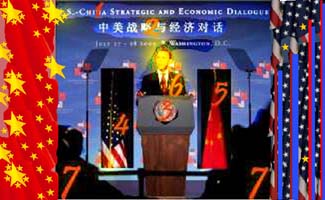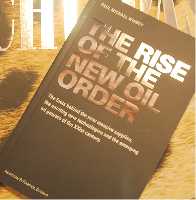
Interview With Mr. Mohamed Ali Alhakim
- Under-Secretary-General and Executive Secretary of the Economic
- and Social Commission for Western Asia (ESCWA)
It is not often you hear about ESCWA, and this is something the newly appointed Executive Director and Under-Secretary-General, Mr Mohamed Ali Alhakim, is about to change.
Mr Under-Secretary-General is a highly articulate person, friendly and very dedicated to bringing about change in his new post. We had a chance to meet with him in Geneva, when, despite his busy schedule, he kindly accepted to receive us and to satisfy our curiosity. Before we leave the floor to Mr Alhakim, let us briefly mention that he was previously the Permanent Representative and Ambassador of Iraq to the United Nations, both in New York and in Geneva; Ambassador and Director of Arab, European, International Organisations and Policy Planning at the Iraqi Ministry of Foreign Affairs, Baghdad; Iraq Minister of Communications; Member of Iraq National Assembly and Foreign Relations Sub-Committee; and Senior Social and Economic Adviser to the Vice President of Iraq. So now, we leave the floor to Mr Alhakim.
Q: What is the reason that you are here in Geneva today ?
First, I am the Executive Secretary of the ESCWA, and ESCWA has 18 Arab countries as member states, so there are always issues and meetings here in Geneva. The purpose of my coming to Geneva is to attend the high-level segment of the International Telecommunication Union, and to present the view of ESCWA and the Arab region to this audience. In addition, I also meet with other heads of agencies.
Q: How is the link between ESCWA and the other UN agencies ?
Actually, so far, so good. With some of them, we have direct cooperation such as with IOM, UNCTAD, WIPO and ITU, where we have a very close partnership. In addition, these have regional offices in our areas, which is an advantage for our collaboration. We collaborated with UNDP and other resident country coordinators to deliver the 2030 agenda.
Q: You are based in a troubled region. How does this affect your work ?
It is, actually, quite troubled, a region full of conflict, and that is where the challenge is. What the region really has going for itself is the growing number of young people, in addition to attention to women and gender issues. Therefore, we are working on these issues. We are also working on the productivity of social and economic development. It is also important for us. Prevention is a priority for the Secretary-General, so, this is another issue we are working too.
Q: What exactly are you doing for prevention ?
We are doing a lot of capacity building – there are many post-conflict issues that we are trying to resolve. We are trying to figure out how the socio-economic issues affect the development of countries and to make sure we have a plan for the next 10 to 15 years for the young men and women coming out of school. There are generations of young people who have graduated from colleges with good degrees, but they do not have jobs, so, unemployment is a big issue.
Q: You also have other issues I presume. What about the water and the water management issues ?
There are national and transnational issues. Water, climate change, energy, renewable energy, use of technology and innovation tied up to youth, development – are all transboundary, and they are important to all countries. Water and water management are definitely big issues for us too.
Q: We have not heard a lot about EWCWA, and you have kept a very low profile. Is this going to change ?
Well I am newcomer. I took up this position in May 2017 and I am trying to make known the organization and the work we do in the various regions. Hopefully, in a year you will be hearing more about ESCWA.
Q: Why only in a year ?
I think I need a year or a year and a half to work through all the different issues. I just had a meeting with Francis Gurry of WIPO. He was saying that we do have cooperation between our organizations but that there has not been any communication between us since 2012. So, I said, let us start now. In this context, I think it will take me a year or perhaps a little longer to put ESCWA on the map.
We have a very attractive website; you could look at www.unescwa.org. We are also very active on the social media – Twitter and Facebook. We publish everything we do, so there is a lot of information on all the different activities we carry on. I therefore encourage you to take look, and I am sure that you will find that many of the things we do are very attractive and useful as well.
Q: We live in Europe where many do have a biased image of the Arab world. Do you perceive this point of view ?
Yes, and that is also one of the challenges we face. We have to see how the information flows and push it up. We work a lot with donors from the Nordic countries, Germany and other countries to support some of our activities. We also have a project on Syria, which is post-conflict and, hopefully, reconstruction; we have one on Yemen and one on Libya where we are actively engaged. So, there are many issues that we are pursuing while cooperating with agencies in New York and Geneva as well as with donors.
Q: You just mentioned three of the worst humanitarian disasters – Yemen, Syria and Libya. How do you cope with all these ?
It is extremely difficult, and it continues to be extremely difficult, especially for countries where a huge number of people have fled the war zones, settling for example in Lebanon and Jordan. Both countries have weak economies, and millions of refugees residing there which put strain on life.
Q: You are living in Lebanon, which is one of the biggest recipients of Syrian refugees. Do you really feel their presence there ?
Without any doubt. There are many Syrians in Lebanon. Some of the Syrians are very entrepreneurial, and they have opened up bakeries, restaurants and other small businesses. This is not the case for the poor Syrians who have very large families, and some live in camps where it is very crowded –you know, a small space and huge families. That put a tremendous stress on Lebanon’s Budget and is really causing the Lebanese a lot of tension, as well as demand for education, demands on health services, water, and sanitation – all this puts tremendous stress on the Lebanese infrastructure.
Q: It is sad to say so, but many people do not really want to know, nor care any longer, about what is happening in Syria and least of all the refugee problem.
Well, it is a challenged area. At the end of the day, we are talking about human beings. They need to get home, get their schools back, their hospitals, get their lives back. People are only happy when they are back home. Lebanon and Jordan are providing temporary hospitality, but it is not enough.
Q: When do you think the reconstruction of Syria will start ?
My thinking is that this is tied up to the political situation. There are safe areas now, some villages, but they want to tie it to the political situation.
Q: What is happening in Libya ?
Libya is a complicated situation. Libya has two governments, and it is split in two parts – East and West, with two parliaments, two heads of government. To bring them together is very difficult. The Gadhafi regime built weak institutions so there is need to build on. The situation in Yemen is far better for they do have institutions, social and economic institutions – for education, for water, for oil and others. In Libya, you need to start building these in addition to everything else.
We have a project in Libya. We work with the Libyans to find out what the priorities are, once the war is done, what the next steps are, what the costs associated with building these institutions will be. How do we do capacity building and train the Libyans? They are smart and well educated, but we need to put the institutions in place. That requires a lot of work, so, I am not surprised that you have not heard about that yet.
Q: What are your ambitions for the organization ?
That ESCWA is serving on the economic and social side for 18 countries is a major plus. Our ambition is really to look at the real issues facing the societies of these countries and proceed from there.
Today poverty is very high, and it is multi-dimensional poverty, not clearly delineated poverty. We are collecting data: how is housing affecting people, how is education affecting people, how are living conditions? When you put them together they become multi-dimensional, and then we see that the poverty of children is acute, about 40 per cent. This is from UNICEF data. We did the survey for the adults, and UNICEF did the one for the children. This is scary.
The second scary part is that the middle class Arab countries are trending down, not up. This is a dangerous trend. When the World Bank and IMF characterize a country as a middle class country, with the future trend not going up but down, it means that the spending on education and on health is not getting its effective dollar value. For each United States dollar spent, 65 cents goes to administration and not to real education, not to real health care. There is still a lot of bureaucracy built in, and our job at ESCWA is really to streamline all this, and provide the Arabs with the capacity to they need to realize that education is a must. Children’s education is especially important, and it must be modernized – not an old curriculum but, new technology, how kids will utilize the new tools and technologies for education. It is a lot of work.
Q: Obviously the various Arab countries are also quite diverse, some extremely rich, whereas others are poor.
Well, having a high GDP does not mean that you have a sophisticated society underneath. I think of the middle of the road, where Iraq, Egypt and Morocco could trend up with their background of human resources. The countries that are weak – Sudan, Mauritania, and Yemen – they are all struggling through these next years.
Q: I just heard that now one can find young Saudis working in areas where one never thought they would be working.
It is true that Saudi society is actually going through huge transformations. I think the young leadership is important, and they are opening up the road for women and children as well for young educated countries.
Q: Do you think this will be the same in the Gulf countries ?
The Gulf countries are much smaller. The Saudis have a population of 30 million, whereas the Gulf countries have much smaller populations. Kuwait is doing extremely well. They are creating tremendous infrastructure to take care women and children and young graduates. In addition, a lot money is going into institutions.
The Gulf area countries are spending lots of money on their human resources. The United Arab Emirates are spending a lot on their people, building infrastructure and technology, developing technology, and they send many young people to study abroad, so they are investing. This is an investment for the future.
Q: Listening to you, one gets the impression that the region has great potential.
I think so. The worst part of it is really the conflicts. If you get the conflicts resolved, I think countries will progress. Let us take Iraq as an example. Iraq went through conflict for years – Iran, Kuwait, the embargo, the change in 2003 and the war against terrorism … Once you give the Iraqis a certain amount of stability, I think the Iraqis have the ability to move very quickly, and they have tremendous resources.
Q: In Iraq, you used to be the best-educated people, and you have everything – water, farm land, oil and human resources.
Education is the part we are worrying about because it is still very traditional and has not been modernized. This is why I discussed with Mr Gurry of WIPO how to get research and development where we hook up the private sector and the universities. That is what we are trying to do with WIPO: link the private sector and the universities, so that intellectual property moves into the universities from the private sector and vice versa. That is how Japan did it, it is how South Korea did it too. Lebanon and Egypt are actually doing well in this area as there are some entrepreneurs who came directly out of college.
Q; I have the impression that most businesses in the Arab World are small and medium enterprises, mainly family owned ones. Is this correct ?
Yes, I am meeting many entrepreneurs with small shops – 10 to 15 employees. Now they are starting on services –software development, 3D printing – things where they can provide services to hospitals, to financial institutions, you will see a lot of young people coming up.

Photo credit: Mission of Iraq, NY
On these optimistic words, Mr Under-Secretary-General had to rush off to his next meeting, and we are confident that Mr Alhakim will be able to put ESCWA back on the map.
Geneva May 2018
Editor note : Since we interview Mr Alhakim, he was appointed Minister of Foreign Affairs in Iraq earlier this year. We here is International Diplomat wish him lots of success in his position.
Article in publication (star-studded) with Diva International Magazine / International Diplomat Global





